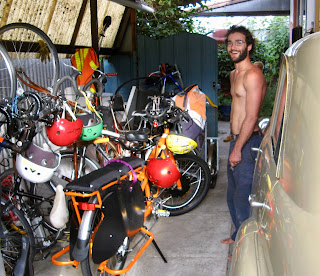'Degrowth in the Suburbs: A Radical Urban Imaginary'
Walking goats in Heidelberg:
 |
| Click image for greater clarity |
I have just finished reading 'Degrowth in the Suburbs: a Radical Urban Imaginary' by Samuel Alexander and Brendan Gleeson of the Melbourne Sustainable Society Institute (University of Melbourne). I loved it. It is realistic yet hopeful. Imaginative and down-to-earth. And it reinforced my, at times wavering, belief that people acting together can be unstoppable. Especially when, as the Paris '68 activists put it, they determine to: 'Be realistic - demand the impossible!'
I was particularly happy to write this review as the themes of 'Degrowth in the Suburbs' are dear to my heart. As the authors put it:
This book addresses a central dilemma of the urban age: how to make suburban landscapes sustainable in the face of planetary ecological crisis. The authors argue that degrowth, a planned contraction of overgrown economies, is the most coherent paradigm for suburban renewal. They depart from the anti-suburban sentiment of much environmentalism to show that existing suburbia can be the centre-ground of transition.
Backyard beauties in Footscray:
 |
| Click image for greater clarity |
I found 'Degrowth in the Suburbs' scholarly but accessible. It provides a thorough overview of where we are and where we need to head. Ecological experts argue that for the rest of the world to consume as Australians currently do, humanity would need four or five planets. So energy descent is no longer a radical notion but an obvious necessity: 'We must figure out how to leave oil before oil leaves us.'
Leaving oil via pedal power in Heidelberg:
 |
| Click image for greater clarity |
Alexander and Gleeson proved masterful in making the idea of living lives of 'voluntary simplicity'/'frugal hedonism' not only a necessity, but even an attractive prospect. As they suggest, and the Hoodies (below) would attest, sharing housing, gardens, animals, tools, child-care leads to a life of rich connections, contentment and great food!
The 'Hoodies' of Heidelberg:
 |
| Click image for greater clarity |
The authors assert that rather than being an environmental calamity in terms of their drain on resources, the suburbs can lead the way forward to an improved and sustainable future. In fact they already are.
People are growing food in their own backyards, courtyards or even balconies. And they are sharing it:
 | |||||
| Click image for greater clarity |
They are converting car spaces into mini gardens (Fitzroy):
 | |
| Click image for greater clarity |
There are even beehives atop CBD buildings:
 |
| Click image for greater clarity |
As the authors point out a model exists already of a country living with minimal access to oil. Cuba found itself in exactly that situation after the imposition of the US embargo. And this necessitated the entire population instantly transitioning to an 'energy descent' lifestyle:
Petroleum free fertilizer - giant worm farm - community urban farm Havana:
 |
| Click image for greater clarity |
Contented cows Havana urban farm:
 |
| Click image for greater clarity |
Contented farmer Vinales Cuba:
 |
| Click image for greater clarity |
Do yourself a favour: buy 'Degrowth in the Suburbs: A Radical Urban Imaginary' by Samuel Alexander and Brendan Gleeson (Palgrave Macmillan).
Check it out at:
Urban imaginary in the making Heidelberg:
 |
| Click image for greater clarity |


3 Comments:
Thanks, Sue. Very thought-provoking. Viv B.
Glad you enjoyed it Viv. And thanks for posting a comment.It is always great to hear from people!
useful article on Denmark's efforts
Post a Comment
<< Home